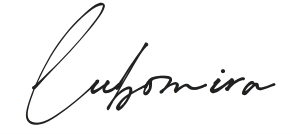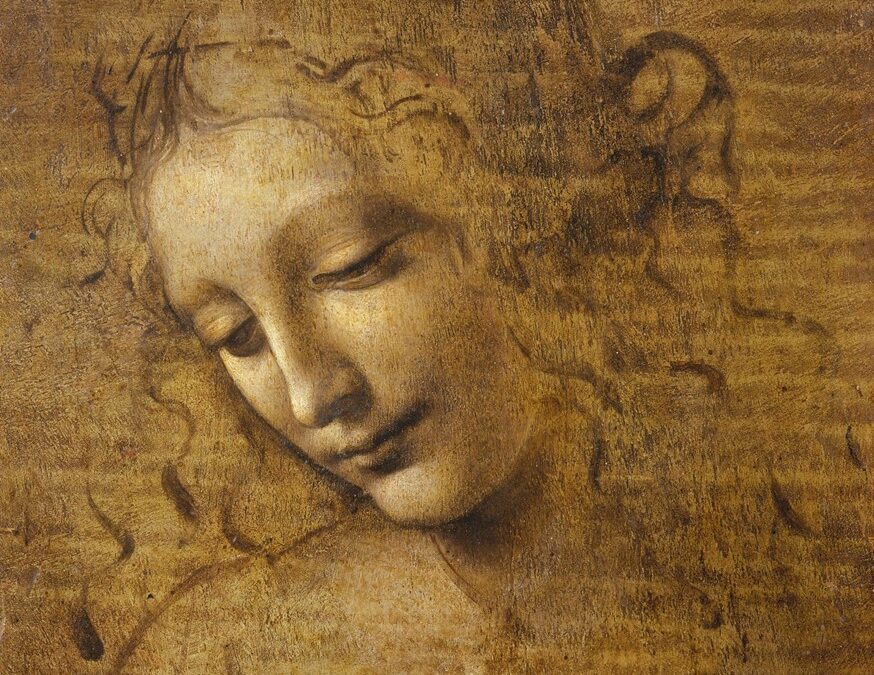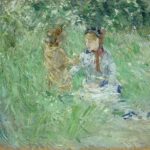What I love about this drawing by Leonardo da Vinci called La Scapigliatta (1508) is that there is a certain sense of humility and purity in her image. The messy hair and faint loose lines remind us that the sacredness of our being isn’t about being perfect as by some human made standards – but that we already are perfect in our mere being. The drawing was also left purposefully unfinished – which to me symbolizes an even greater wisdom: that we are continuously becoming, unveiling the layers towards our true essence.
In a world that’s increasingly dehumanizing, we need to have humility – this is the bridge that connects our three pillars of faith, hope and love. Humility is the recognition that it is not us that are the center of the universe – that we must live with an understanding of interconnectedness and honour all other shapes and forms of life, including other people, as well as animals and nature. No being is too small or insignificant, unworthy of our respect, attention or care. And even if we don’t like it, that still doesn’t mean we should mistreat it. Without humility, I don’t think that we would be able to even recognize anything meaningful in life.
Sacredness, like purity and devotion, is a word that may seem as some grand thing – high minded and even abstract. And in a world of over-sharing and constant noise, perhaps we’ve even forgotten what it really means. There is certain level of privacy, quietness and intention that is needed.
Sacred means holy which means wholly. To be whole, we don’t have to be “perfect” by some societal norms – we need to allow ourselves to accept that we are as we are and have to stop shaming, blaming and rejecting parts of us. When we view something as sacred, we ultimately release expectations of it and just honour its presence in our life. Sacredness is about true acceptance and allowance of someone’s or some thing’s true essence.
Watch an animal, a flower, watch water – how it rests in its being. It is unmistakably itself beyond our human mental habit of naming and labeling. There is a harmony that extends to us also in this deep noticing. When we recognize the sacredness, the stillness, the beauty and dignity in which we exist as we are, just like a rose exists as it is, just as a squirrel exists as it is, we hold that beingness, innocence and holiness in our awareness. And through our awareness and recognition, the other comes into its knowing also – it comes to know its own beauty and sacredness through you. And in this silent space, we hold it – and it holds us too. And we realize our own sacredness.
On a collective level, we often grow up feeling not good enough, not worthy enough, not loved enough; we are only appreciated when we accomplish something like a good grade in school, or when we do as we are told by our parents. Any psychologist will tell you that the root of most problems in life is the lack of enough cuddles when we were children. And by the time we become adults, the not good enough beliefs ingrained in our subconscious continue to be perpetuated by society and our surroundings. Fix this, change this. Our inner critic loves these beliefs and conditions; and we turn against our own selves when we are being so hard on ourselves, and when we judge and criticize ourselves. In the times when we don’t – someone else does that to us, not necessarily to hurt us but because they are unaware.
When we turn on the TV all we hear is how bad humanity is. Flawed, damaged, and now we are viruses. Especially those who aren’t vaccinated. There is always someone to blame, the media tells us. And we believe it because no one else is telling us otherwise. In our own families we may have grown up with a sense of blame and guilt – every time something didn’t fit someone’s mood or expectation, we were at fault. A crime and punishment mentality separates us even further. And there is no room for freedom, creativity and we start to isolate in order to preserve ourselves. This crime and punishment mentality also leads to more criticism. We are told some feelings are good to express, but others aren’t because they are bad – and so we suppress ourselves and grow up not even knowing how to feel our feelings. We grow up disconnected, disappointed and ashamed – which makes us more likely to harm another. We forget we are sacred. And the perspectives that we are assholes continue to be perpetuated until we believe them, and start acting them out.
But even when we forget our sacredness, it doesn’t forget about us; the sacred still moves through us like the purity of water, and we can access it at any time. No matter how far beneath the desert land it is, if we dig long enough within we’ll find it. To live a sacred life, we must remember to hold and nurture a space where our true essence has the freedom and ability to express itself, and to thrive. We need to feel seen, appreciated, honoured, respected and recognized for our beingness, rather than for what we accomplish or wear on our names as categories or titles.
The truth is: what you are currently reading, about how humanity isn’t bad and how we are all sacred, is what I had written and posted yesterday as part of another article What Secrets Water Knows. And it sounds beautiful and perhaps even hopeful, but after posting my article I went to the park, where I saw two boys throwing rocks at the body of a dead squirrel, and laughing. And their mothers stood beside them, laughing.
Now tell me – where is the sacredness in this? How are these humans of the divine? All I could do in that moment was break down in tears holding my chest gasping out of pain, Oh Gospodi (Oh my God). I go to that park almost every day and feed the squirrels there. There was one who was injured and I cared for her the whole summer. There are rabbits too, and it’s all just become a part of me.
What kind of a world is this, if children are throwing stones at dead animals with their mothers laughing beside them? During a pandemic nonetheless – didn’t we learn anything?
When I came back home I opened my essay and looking at it I was just so tempted to delete the part about sacredness. How could I sit here and talk about this when it feels so hard to find the sacred in such actions? Sure, from a higher perspective all is needed and I actually felt sad that such a world of ignorance and poverty lives inside them – because otherwise how would anyone ever treat an animal in this way? And it was their mothers, with their dogs and strollers, that were being okay with this, which to me was the most shocking part. You see, I can talk all about how we need to be more understanding, compassionate and forgiving – but in times like these, trust me I find it hard to brush off such actions with some high minded spiritual statement. I’ve seen many horrible things throughout my life and I’ve been in many places around the world where I’ve come face to face with violence and brutality, to the extend that I really questioned whether all people are naturally good when born. But then to see this, in a big city like Toronto, right after I’ve written about sacredness felt like I had a humbling chance to respond and reflect on what of my own actions would follow. I didn’t delete the essay – in fact I added the part about the squirrel and am now posting as a separate article here – because it deserves its full attention.
I can’t change the world, at least not in the way that I’d initially thought – but what I can do is continue to carry love not only as part of my name, because my name Lubomira means “love and peace”, but as what I believe, stand by, and hope to continue to embody. All I can try to do is a tiny attempt to create, and hold, a space within me for my own sacredness, and try to recognize it in others whenever I can. All I can try to do is be devoted to my own actions and love, despite what happens in my life, and hopefully someone might feel inspired to be a little more kinder, and loving too.
Perhaps we need more sacred things to look at and be exposed to – in order to be more human. Perhaps, it is precisely the lack of sacredness in our lives, that makes us inhumane.
When we fail to recognize the sacredness in another being – we will be more likely to harm it because we are ultimately denying its right to exist, be respected as living being and be honoured in its essence.
And while as living beings we carry the sacred as a thread within us, when we abandon it, we choose to abandon our humanness. Human versus humane: one letter makes a big difference, and often times in life, it’s the smallest things that make the biggest differences.

The way we treat nature and wildlife is a direct reflection of our relationship and treatment towards humans, and ourselves. Because everything around us – is just an extension of our own consciousness and inner life.
God is not up there – God is found in the eyes of our loved one, in the eyes of a squirrel, and in our own eyes when we look into the mirror. What we see that’s individual to us but – God is an inner experience. Just like love is an inner experience, just like tea is inner experience.
We need to have a guiding star – a higher principle that guides us and roots us based upon love, humility, integrity, moral and humanness.
We live in a world that’s increasingly disconnected, where everything is increasingly dehumanized, as people are turned into non-people soon to be robots, detached from nature, just faces on screens, swipeable and disposable, and where even art and culture seem to diminish our lives as opposed to enriching it. We can’t protect children from the dangers and brutality of our world, but we can at least hold them through it and try to raise them with the stable roots of the values of humanity and humanness. This is one of the reasons why I believe that storytelling is so important for their emotional and psychological development, and you can read why in my article The Importance of Fairytales for a Child’s Wellbeing.
Sacred also implies protection and tenderness. We all have a sacred space within us which connects us to something pure and divine, whether we call it God or otherwise. It is unnamed, untamed, and exists in the spiritual and emotional landscapes within us. This sacred space is not meant to be shared nor understood by everyone – it is ours and ours alone, like the secret stream beneath the rock we found. It is not our husband’s, not our parents’ – it is only ours and we access it, connect to it, nurture it. We keep it private. We build bridges to it with our faith, trust, tenderness and love as we walk our own unique paths each day. And when we feel disappointment, that’s okay; and when we feel fears, that’s okay, we’ll hold our hand also.
When I think of sacredness, I also think of the Sacred Heart. The Sacred Heart, or the heart of Jesus Christ, symbolizes his passionate love and undying devotion for humanity. It is often pictured with thorns around it, bleeding and yet on fire, ever beating. It’s because it carries within it everything.
The Sacred Heart is the embodiment of heaven on earth; it is both of human flesh and divinity, forever burning passionately for, of, and with, love. It bled, it cried, it suffered, it sweat – it embraced all weaknesses and frailty of the human condition. It is the containment of all pain and all love; it is the scarred and scared and the sacred. It is the evidence that no matter how many thorns are in it, no matter how much it might cry and bleed, it will always continue to beat with love behind our breasts and to shine even brighter than ever – it is ever lasting, because love is ever lasting. Then, now, always.
We can try to treat our life as a sacred act. This will change our perspective and experience. As a writer, I sometimes worry about what people will think after they read my books or essays; my inner critic loves to indulge in occasional catastrophic fantasies how I am not good enough and how it makes no difference. Rejection is a part of every writer’s life, no matter how long we’ve been writing, and if you aren’t rejected yet then you haven’t put yourself out there as much – it’s just something we have to deal with. And sure – it makes us doubt and it smashes our confidence. In some ways, writing is a weaving art of obstacles and mastering limitations. Some people try to mold themselves into something more mainstream so that they can make a living, while others just can’t because each part of their body screams no to living a life of inauthenticity. Often times, it’s not even about talent or skill, it’s about marketing, and being packaged into a particularly selleable product. And if you don’t know this world very well, you might start doubting yourself, thinking how much heart you poured into something but it isn’t paying off, just yet. Or you might fear someone’s harsh critique shredding you to pieces. The truth is: The mainstream opinion, or anyone else’s opinion, is something the inner critic may love – but it is nothing more than just an opinion and a bruise to the ego.
The only way out of these doubts, or any doubts in life, is to focus on the sacredness of what we do and who we are – because sacredness is also about intention and devotion. If I treat my writing as a sacred art – that implies that what I should be focused on is how my writing can open hearts and ears. The public, the opinions, the audience – that’s not my work, I am not an advertiser. I’m the heart and soul of the hands that write. Sure, I can let myself feel overwhelmed and stop what I am doing for the many fears available out there – but I love what I do. It gives me joy, purpose, stability and freedom of my creative self-expression. My sacred work focuses on the feeling that I am contributing – because words matter, and they sometimes change not only hearts and minds, they can change lives too.
Love what you do. Love what you speak. Love what you eat and drink. Love how your eyes open in the morning and how your lips touch the glass from which you’ll drink tea. Love your hands – how they cook meals, create stories and touch the hand of your beloved. We must find love in our beingness, especially in the times when we think we aren’t doing anything, and move lovingly with compassion through our perceived “faults”. There is nothing not good enough – everything is exactly as it needs to be right now in this moment. If we are divine beings, and we are, then it is only natural that whatever consciousness runs through our body, knows exactly what it’s doing, even if our minds can’t rationalize it or make sense of it yet.
When we are enamoured by what we do, what we hear is a heart. In this state of grace, other voices and sounds are heard, all of which have stories to tell, of even more love.
Sometimes I forget how far I’ve come, and I allow the voices, expectations and projections of others to distract me from myself. Perhaps I don’t seem like I’ve come far enough in a particularly material way – but it is very far, in a way only I know. And in the times when with messy hair I go to the park to feed my squirrel, watching her go round and round, only to then come back to my hands again, where we share a tenderness perhaps only we understand – I settle into the quiet corner of my heart which tells me clearly this is so perfect.
For personal readings with me, you are welcome to browse through my Offerings.

For more of my writings, browse through my Art of Love.
If you wish to support me and my work, you may do so by sharing it or donate here. For personal readings with me, you may visit my Offerings.
Your support means so much to me! Thank you wholeheartedly!




